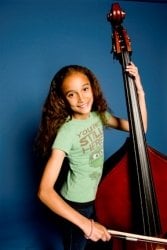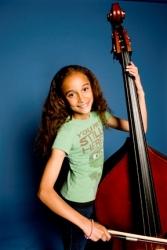
Children between the ages of 3 and 10 should have a parent present at both lessons and practice sessions. Parents will therefore have a powerful influence over making those sessions joyful learning experiences. Praise is your most powerful tool in this process. Always break down the challenges into small increments, and then praise each success. This sense of accomplishment is what makes practice fun at any age.
Keeping practice time age-appropriate leads to more enjoyment, says Goran Berg, director of the Suzuki program at the Crowden Center for Music in the Community. “Pre-schoolers should stop practicing while there is still a smile on their face,” which could be after increments of five minutes. Rather than setting a timer, try to achieve a number of repetitions of an area of difficulty. Goran uses a counting abacus. After each repetition, the child moves pretty beads from one side to the other. They love the counting process and the repetition becomes visibly concrete. Older kids should practice an amount of time per day corresponding to their lesson time, i.e. practice 30 minutes per day for a 30-minute weekly lesson.
It is more fun for kids when adults aren’t telling them what to do. Goran’s students use dice or lucky cards to assign certain random elements to their practice routine. The youngest kids use picture cards to determine which song to play or how many times to play it. Other learning games like flash cards, melody BINGO cards, and magnetic notes, are available online.
The use of reward systems like stickers and prizes is debated in the music education community. While these small rewards can really motivate students to achieve, some educators caution that such “bribes” can be too much of an end goal. Goran suggests focusing on the musical product as a reward, (a good tone is the reward for practicing tone studies) which also increases intrinsic love for the instrument.
Build a social community. Practice is more fun if you can share it with a peer group. Arrange for group lessons, master-classes, and recitals. Practice exercises or duets with a friend. Look for a teacher or other parents that can provide these opportunities.
Additional tips for older students:
- Have a practice plan and check off the list as you go. However, mix it up so it’s not always the same.
- Vary the place where you practice. Outdoors or in an acoustically live bathroom can be fun.
- Work towards a goal of performance even if it’s just for the family. You might consider entering a competition.
- Listen to recordings of the repertoire you are playing, even on YouTube. Be critical about what you hear.
- Play a tune you like by ear and improvise for a while. Add some blues or rock music to your repertoire just for fun.
- Have fun with a tape recorder playing duets, Music Minus One, or listening to your practice with an outside perspective.

